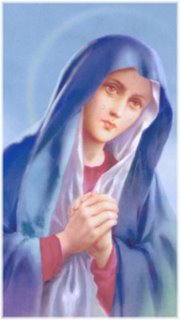English
At the Cross her station keeping,
stood the mournful Mother weeping,
close to her Son to the last.
Through her heart, His sorrow sharing,
all His bitter anguish bearing,
now at length the sword has passed.
O how sad and sore distressed
was that Mother, highly blest,
of the sole-begotten One.
Christ above in torment hangs,
she beneath beholds the pangs
of her dying glorious Son.
Is there one who would not weep,
whelmed in miseries so deep,
Christ's dear Mother to behold?
Can the human heart refrain
from partaking in her pain,
in that Mother's pain untold?
For the sins of His own nation,
She saw Jesus wracked with torment,
All with scourges rent:
She beheld her tender Child,
Saw Him hang in desolation,
Till His spirit forth He sent.
O thou Mother! fount of love!
Touch my spirit from above,
make my heart with thine accord:
Make me feel as thou hast felt;
make my soul to glow and melt
with the love of Christ my Lord.
Holy Mother! pierce me through,
in my heart each wound renew
of my Savior crucified:
Let me share with thee His pain,
who for all my sins was slain,
who for me in torments died.
Let me mingle tears with thee,
mourning Him who mourned for me,
all the days that I may live:
By the Cross with thee to stay,
there with thee to weep and pray,
is all I ask of thee to give.
Virgin of all virgins blest!,
Listen to my fond request:
let me share thy grief divine;
Let me, to my latest breath,
in my body bear the death
of that dying Son of thine.
Wounded with His every wound,
steep my soul till it hath swooned,
in His very Blood away;
Be to me, O Virgin, nigh,
lest in flames I burn and die,
in His awful Judgment Day.
Christ, when Thou shalt call me hence,
be Thy Mother my defense,
be Thy Cross my victory;
While my body here decays,
may my soul Thy goodness praise,
Safe in Paradise with Thee.
Amen
Latin
Stabat mater dolorósa
juxta Crucem lacrimósa,
dum pendébat Fílius.
Cuius ánimam geméntem,
contristátam et doléntem
pertransívit gládius.
O quam tristis et afflícta
fuit illa benedícta,
mater Unigéniti!
Quae mœrébat et dolébat,
pia Mater, dum vidébat
nati pœnas ínclyti.
Quis est homo qui non fleret,
matrem Christi si vidéret
in tanto supplício?
Quis non posset contristári
Christi Matrem contemplári
doléntem cum Fílio?
Pro peccátis suæ gentis
vidit Iésum in torméntis,
et flagéllis súbditum.
Vidit suum dulcem Natum
moriéndo desolátum,
dum emísit spíritum.
Eia, Mater, fons amóris
me sentíre vim dolóris
fac, ut tecum lúgeam.
Fac, ut árdeat cor meum
in amándo Christum Deum
ut sibi compláceam.
Sancta Mater, istud agas,
crucifíxi fige plagas
cordi meo válide.
Tui Nati vulneráti,
tam dignáti pro me pati,
pœnas mecum dívide.
Fac me tecum pie flere,
crucifíxo condolére,
donec ego víxero.
Juxta Crucem tecum stare,
et me tibi sociáre
in planctu desídero.
Virgo vírginum præclára,
mihi iam non sis amára,
fac me tecum plángere.
Fac, ut portem Christi mortem,
passiónis fac consórtem,
et plagas recólere.
Fac me plagis vulnerári,
fac me Cruce inebriári,
et cruóre Fílii.
Flammis ne urar succénsus,
per te, Virgo, sim defénsus
in die iudícii.
Christe, cum sit hinc exíre,
da per Matrem me veníre
ad palmam victóriæ.
Quando corpus moriétur,
fac, ut ánimæ donétur
paradísi glória.
Amen.
















